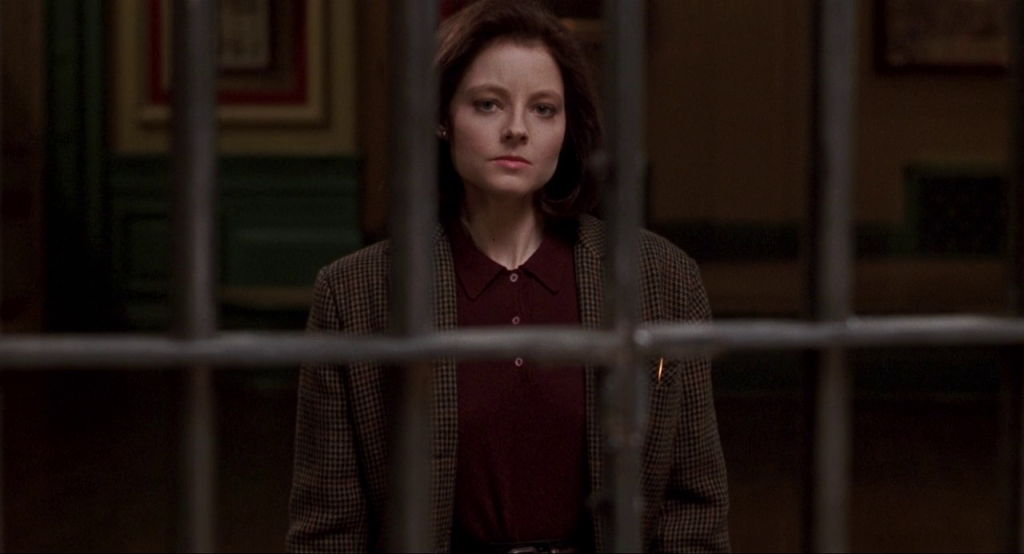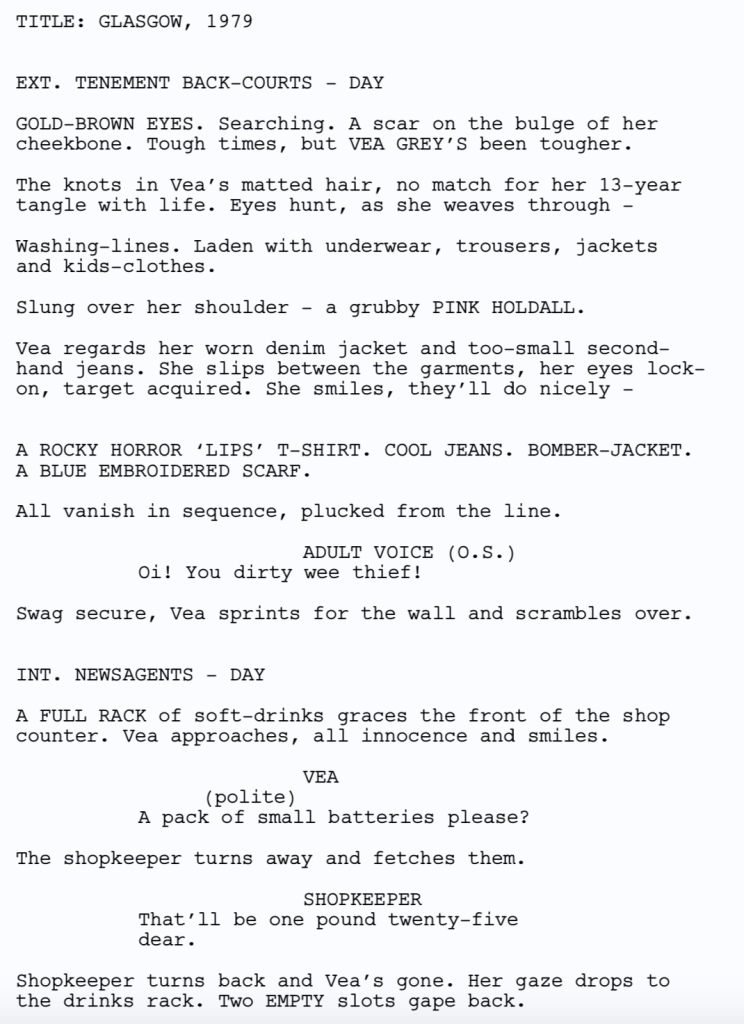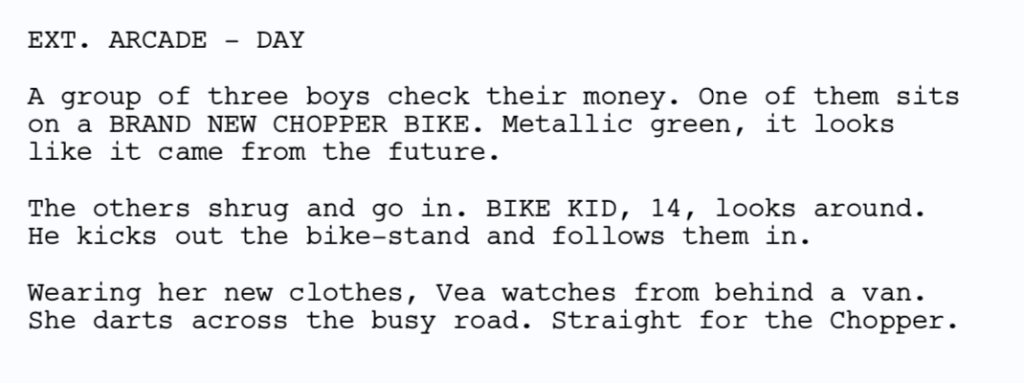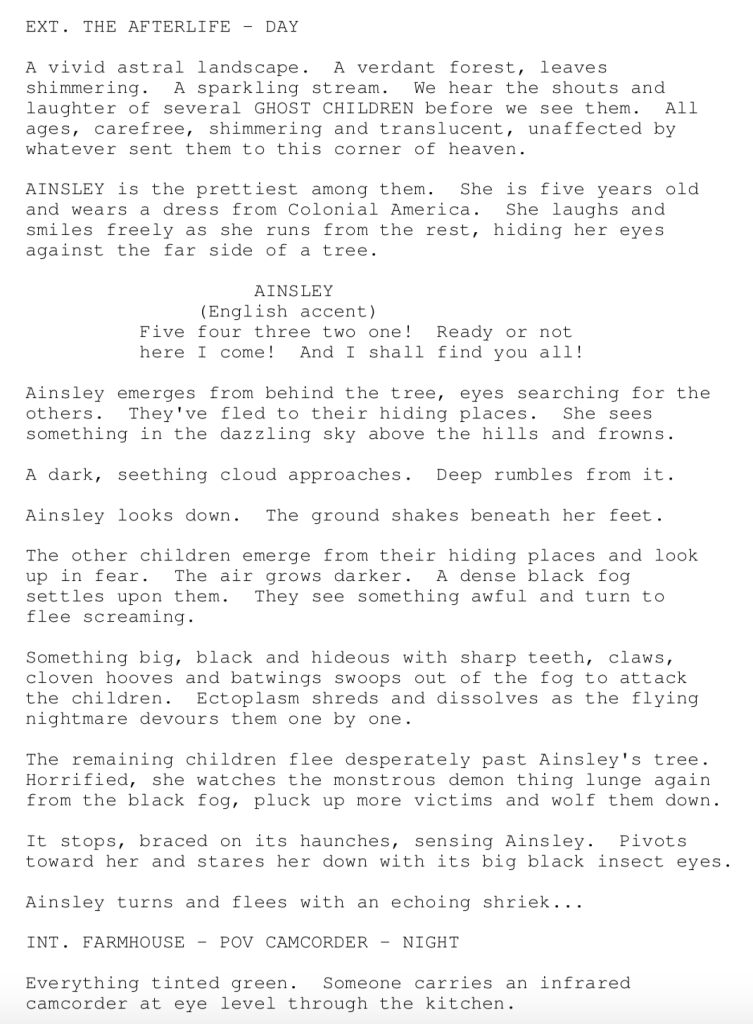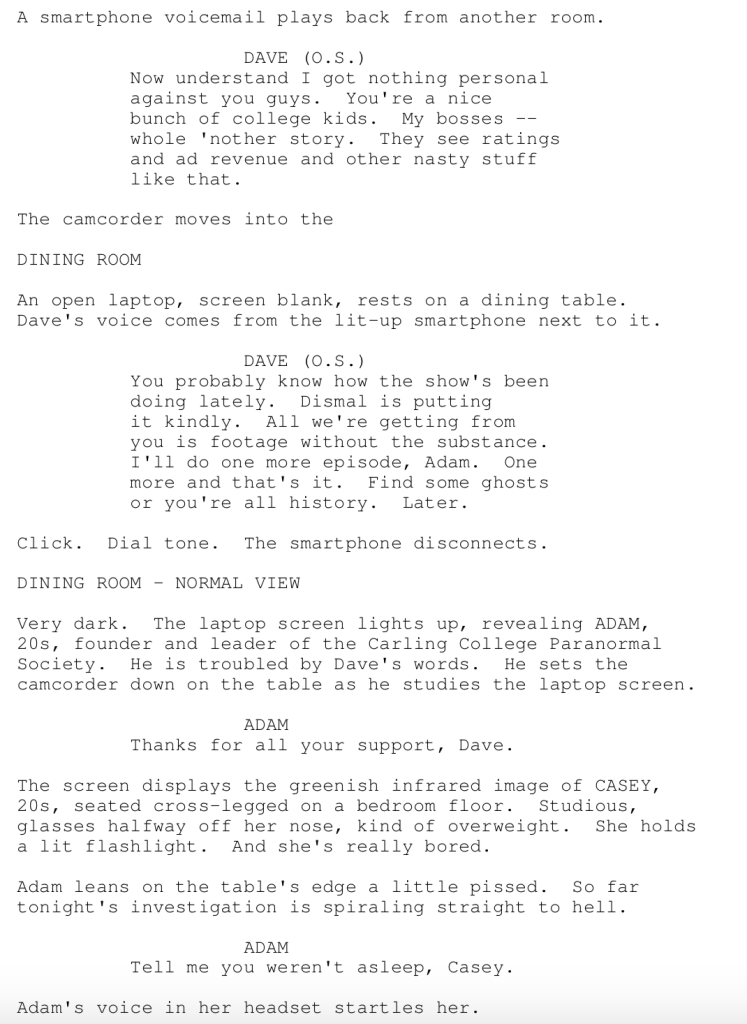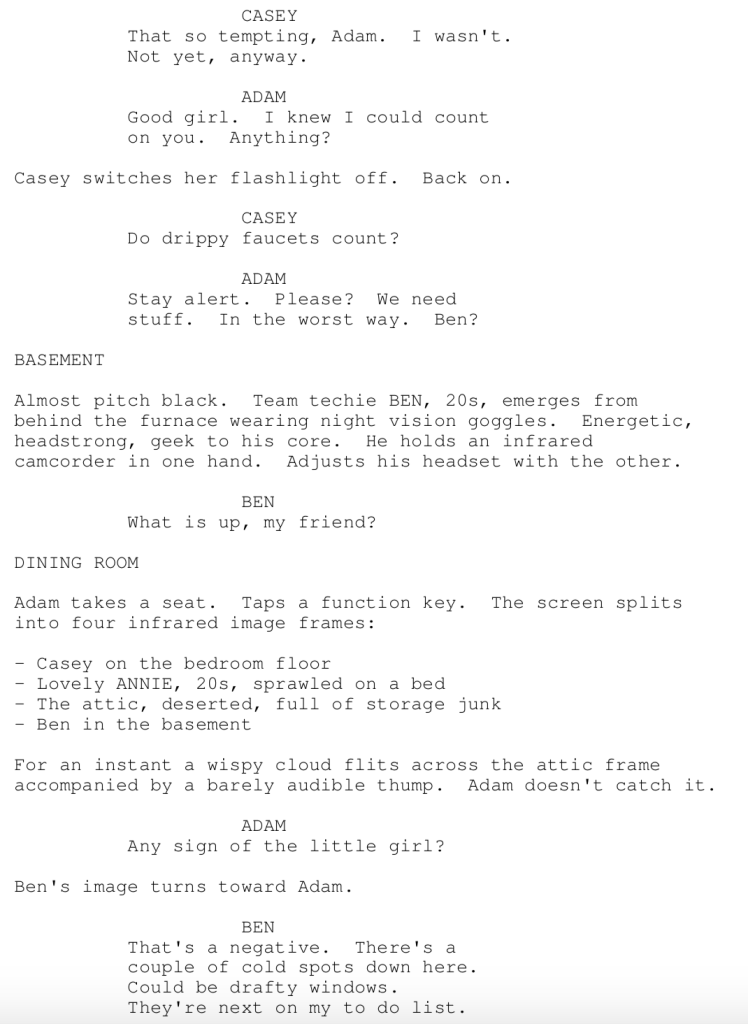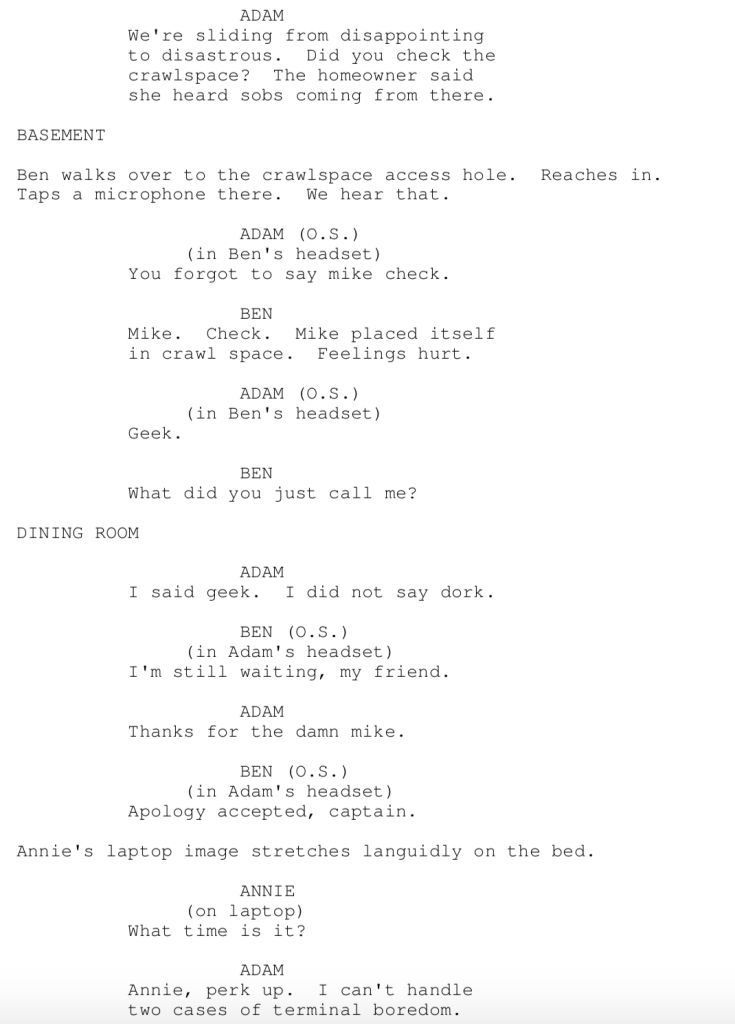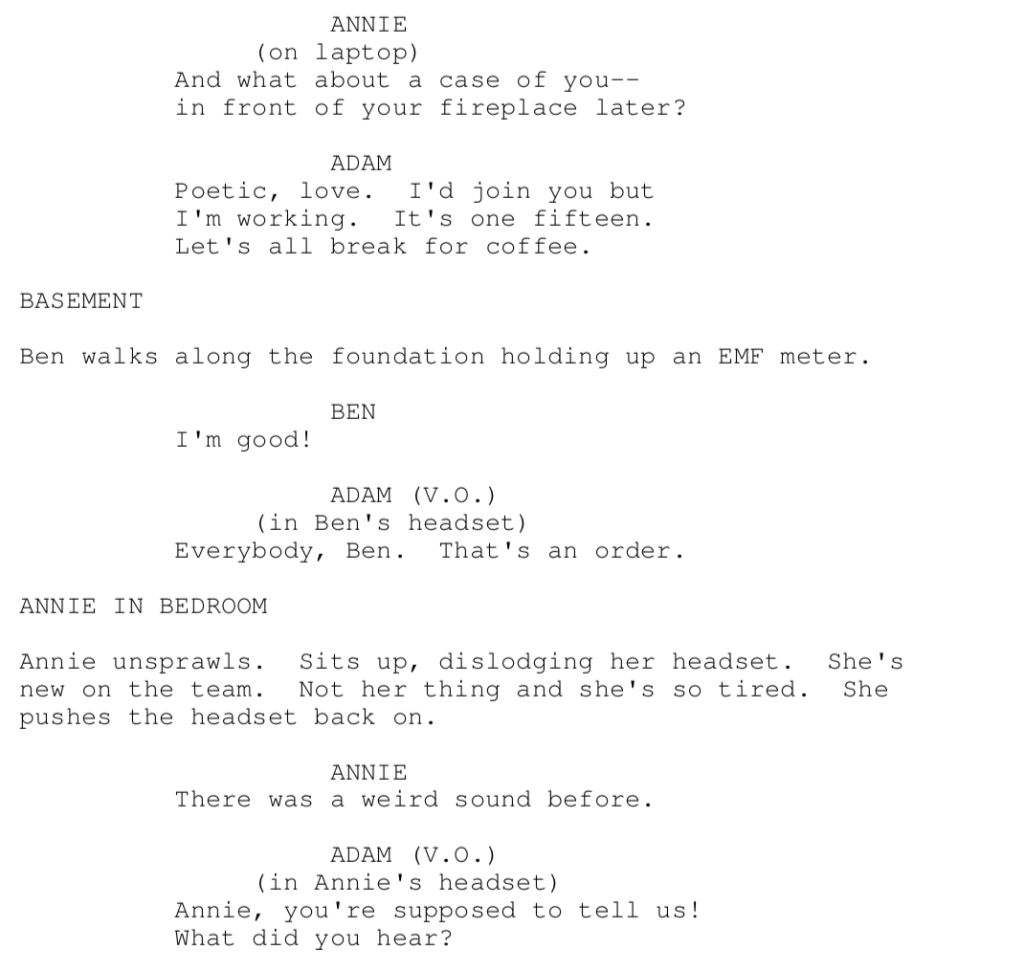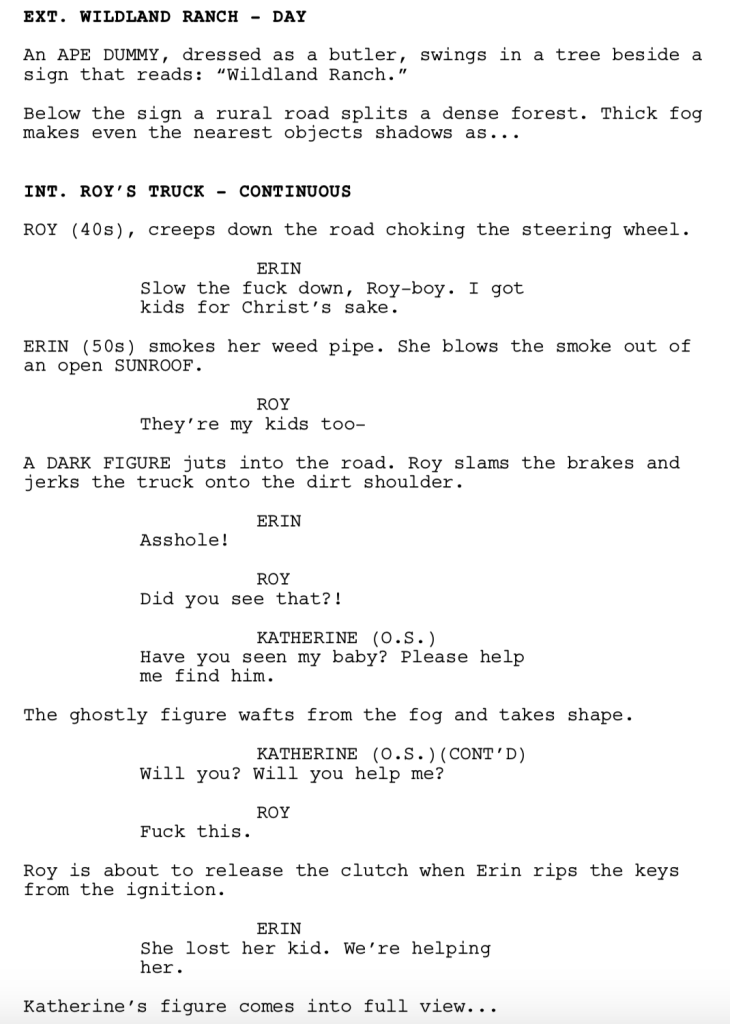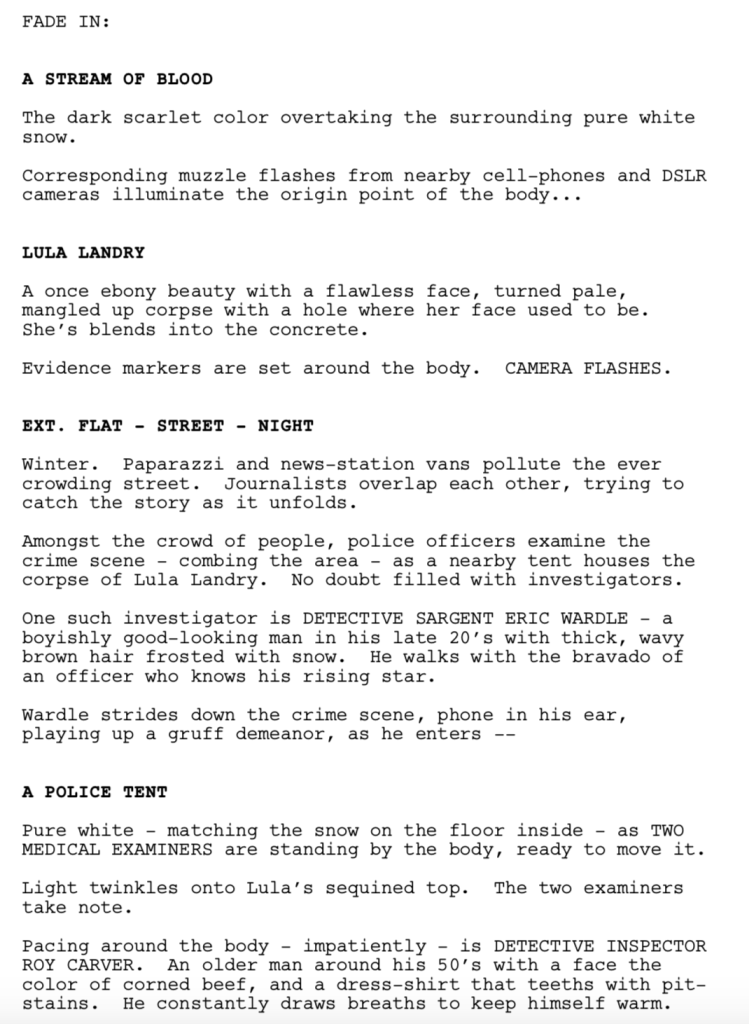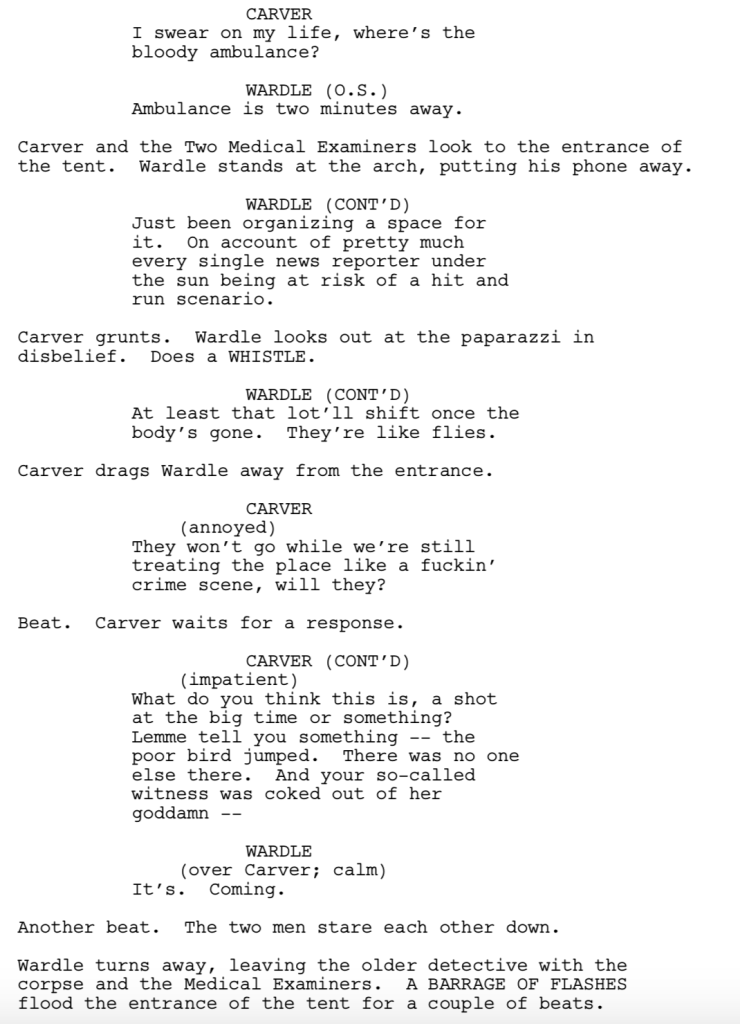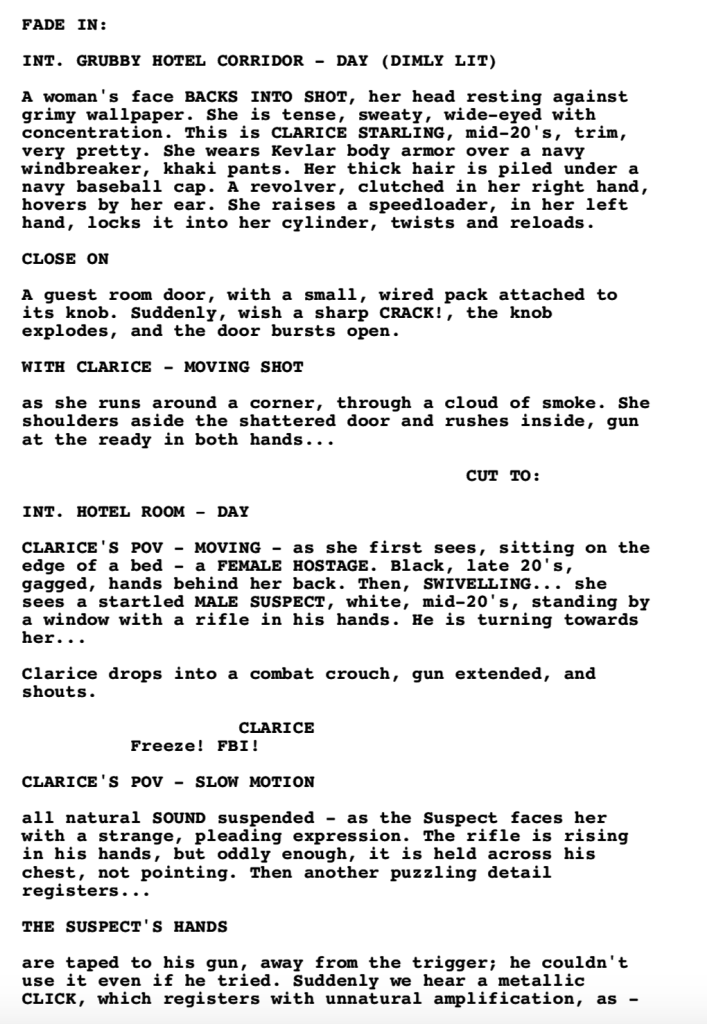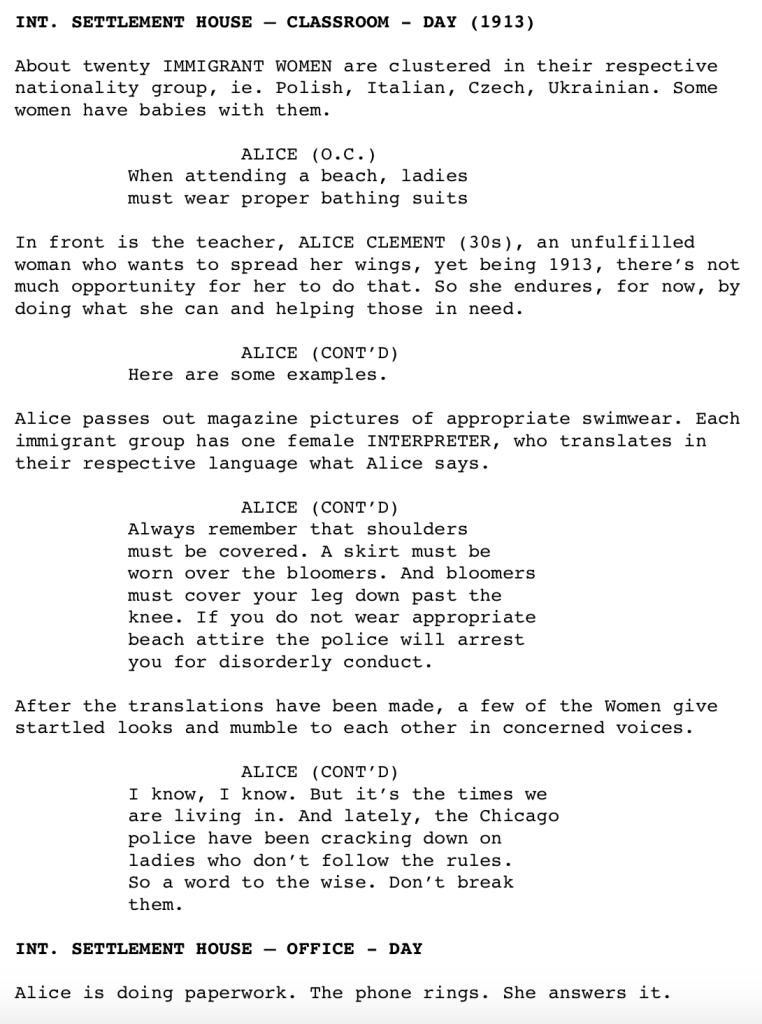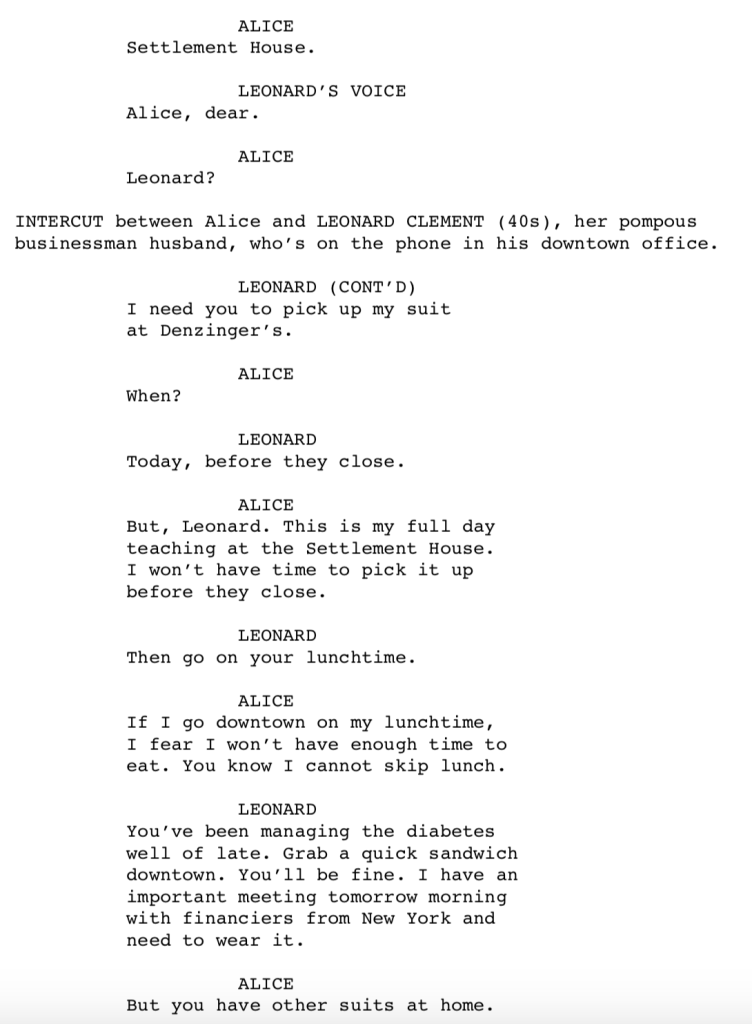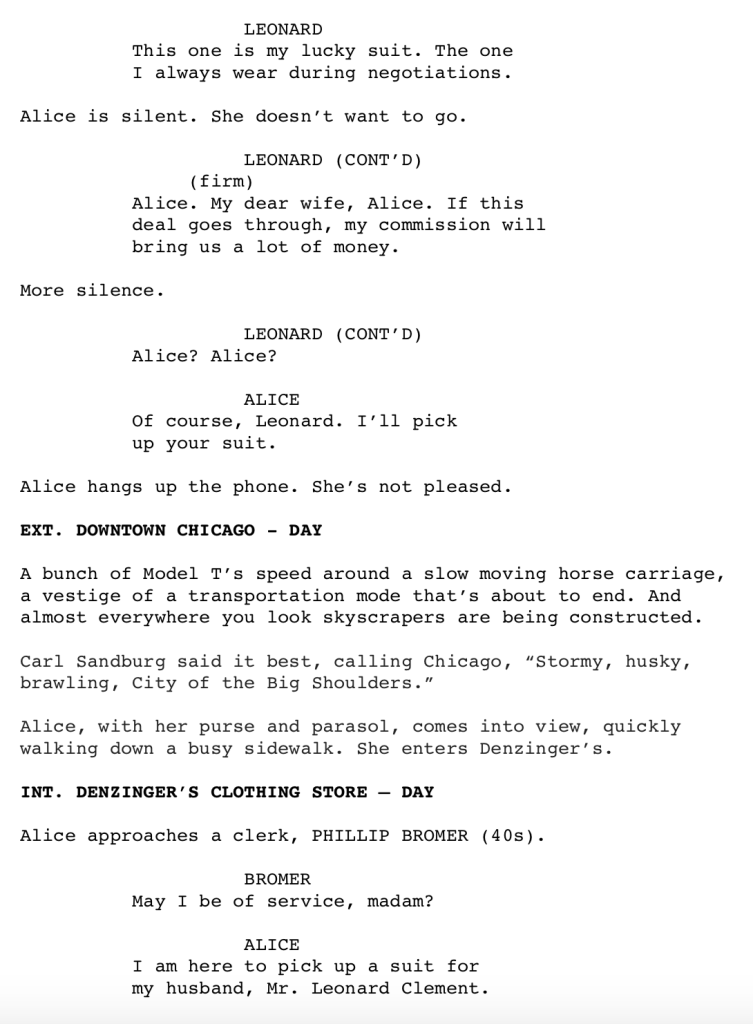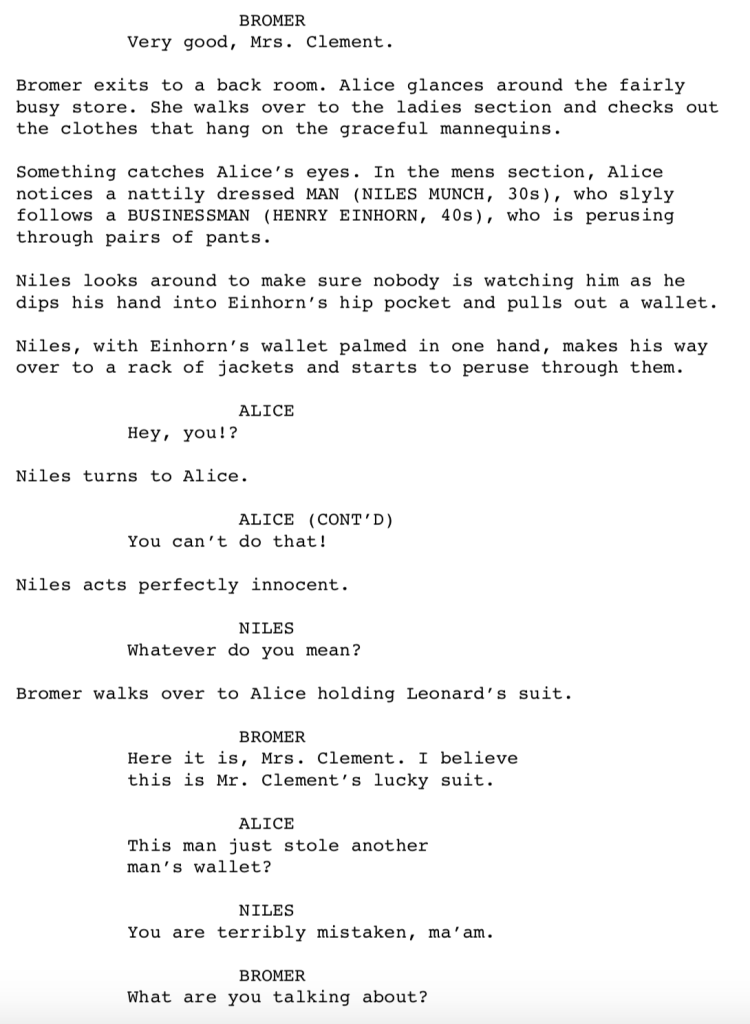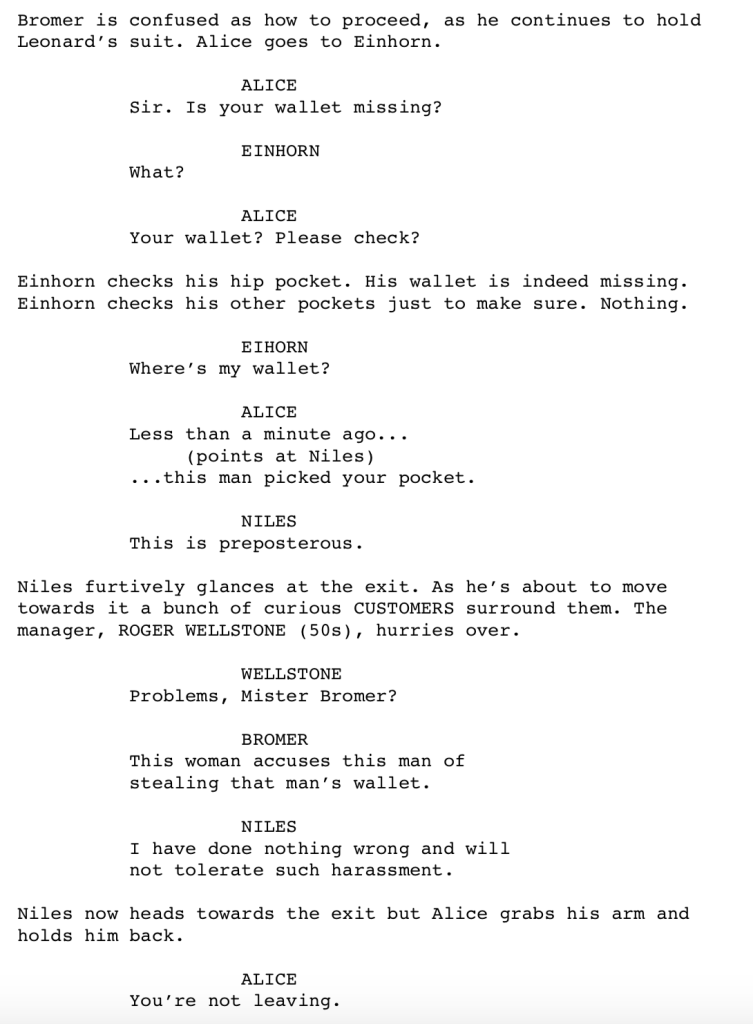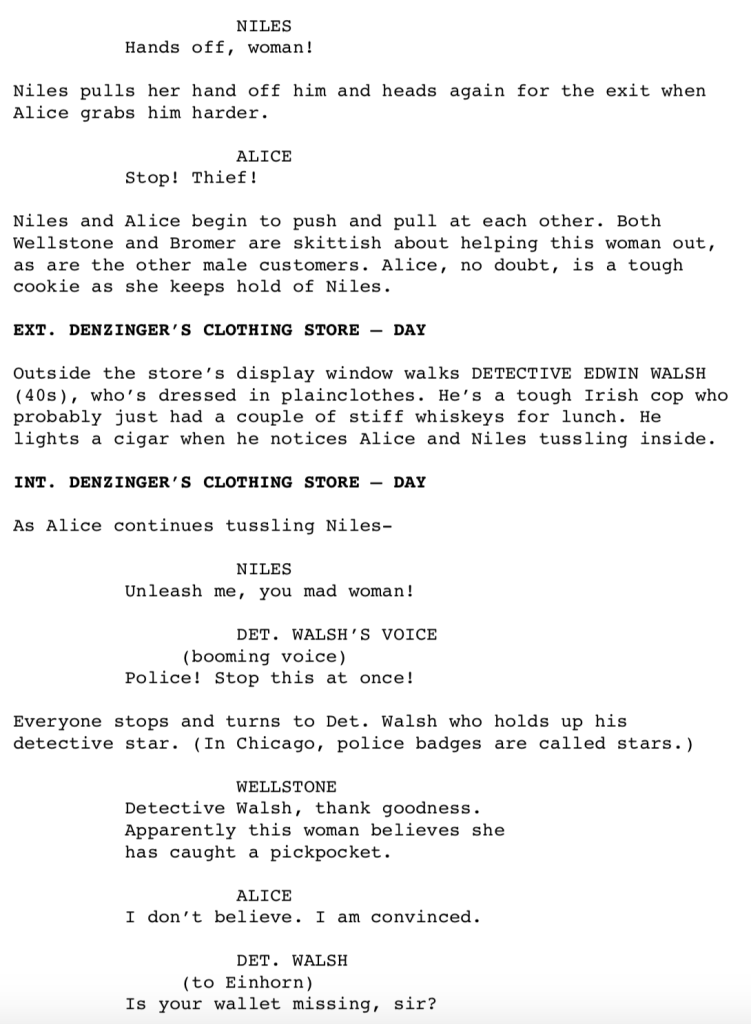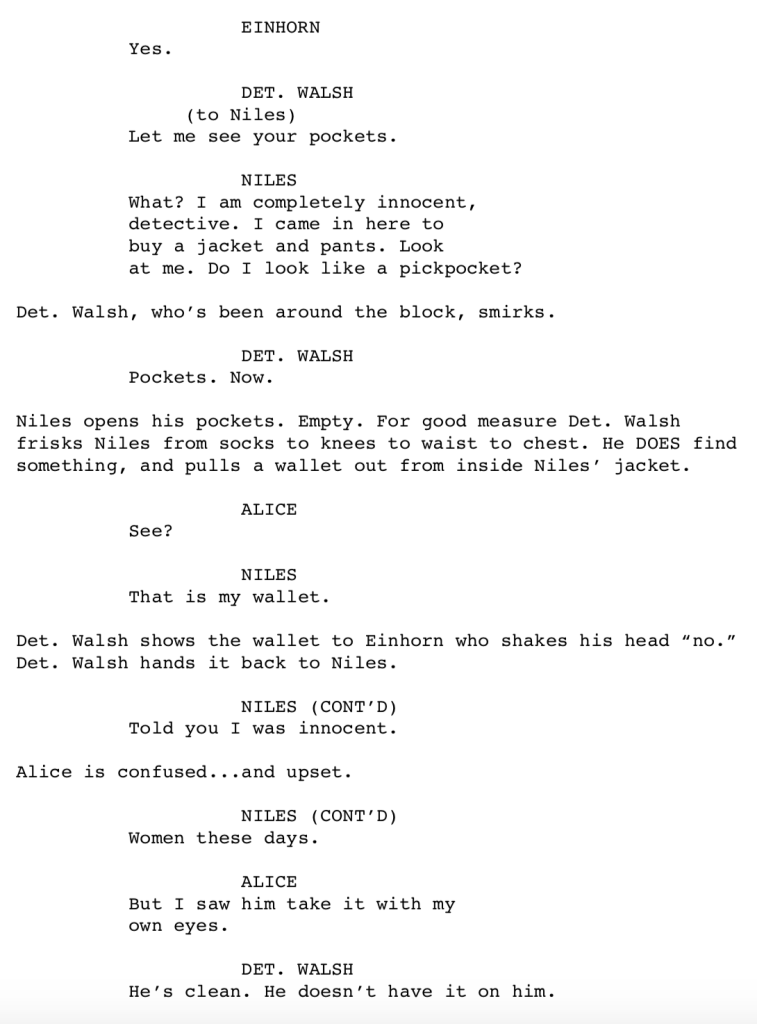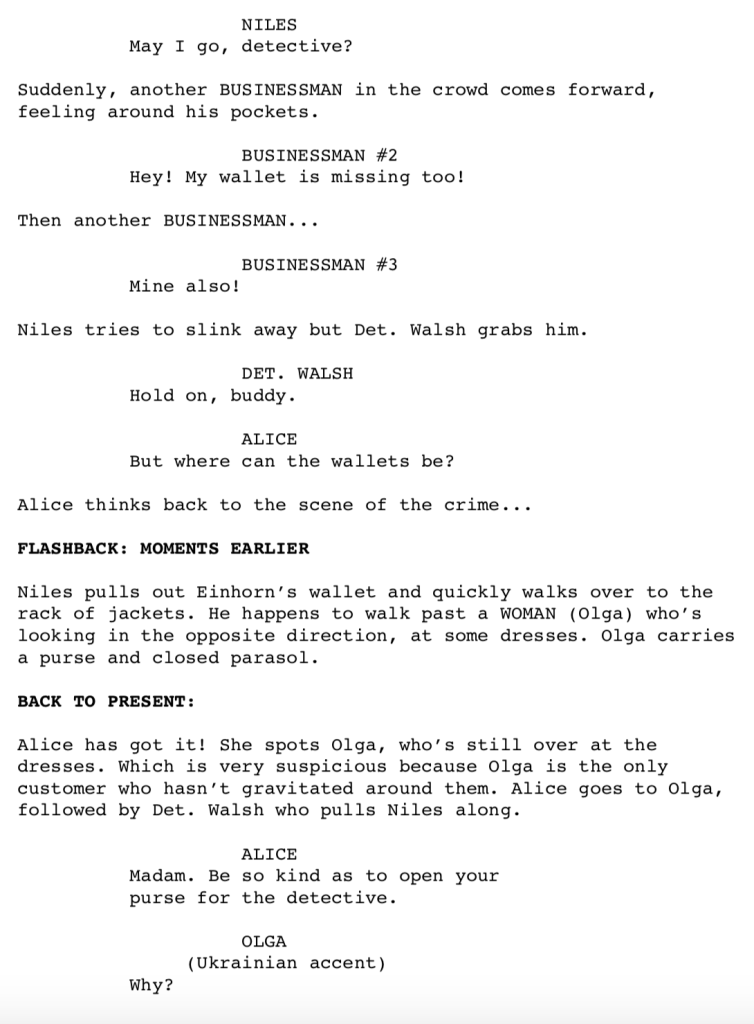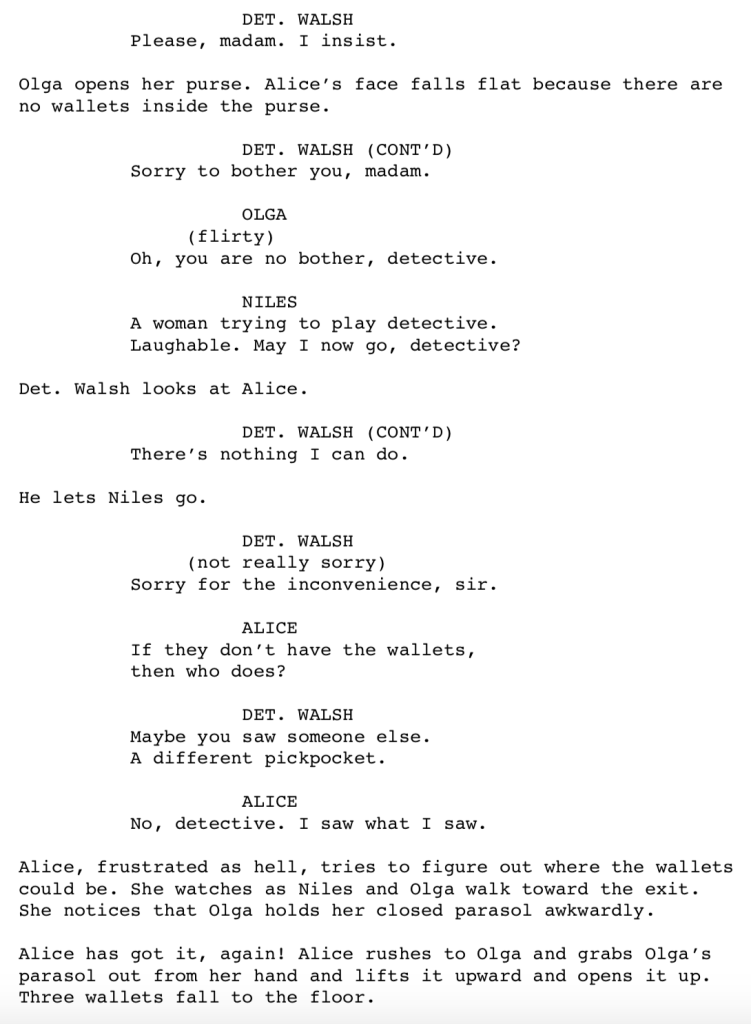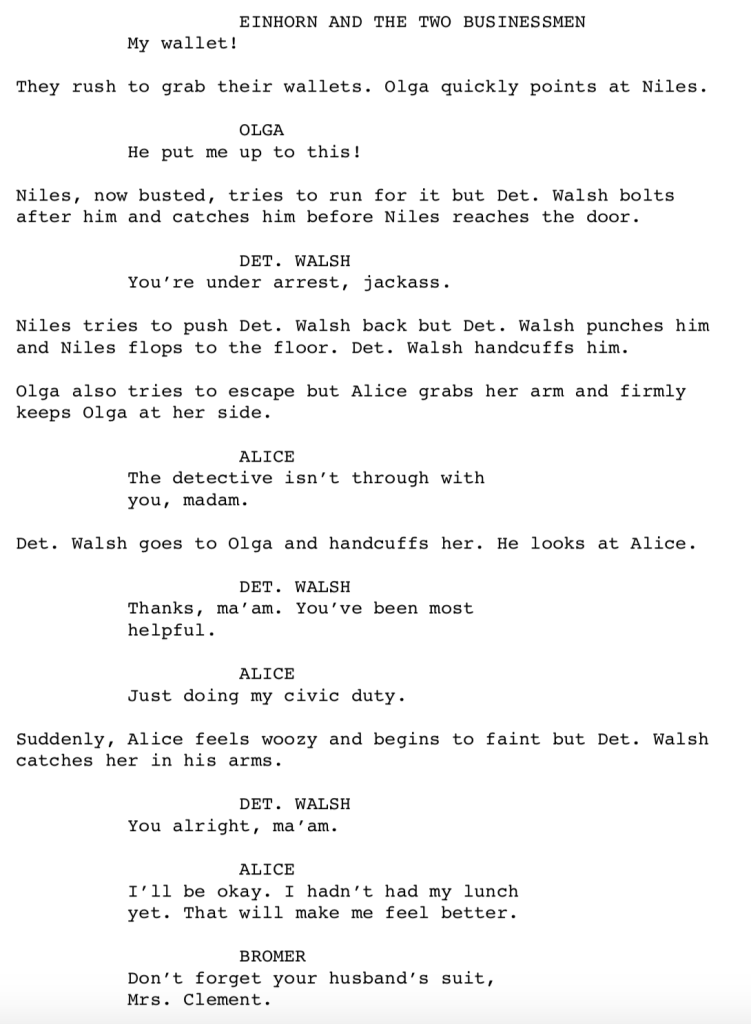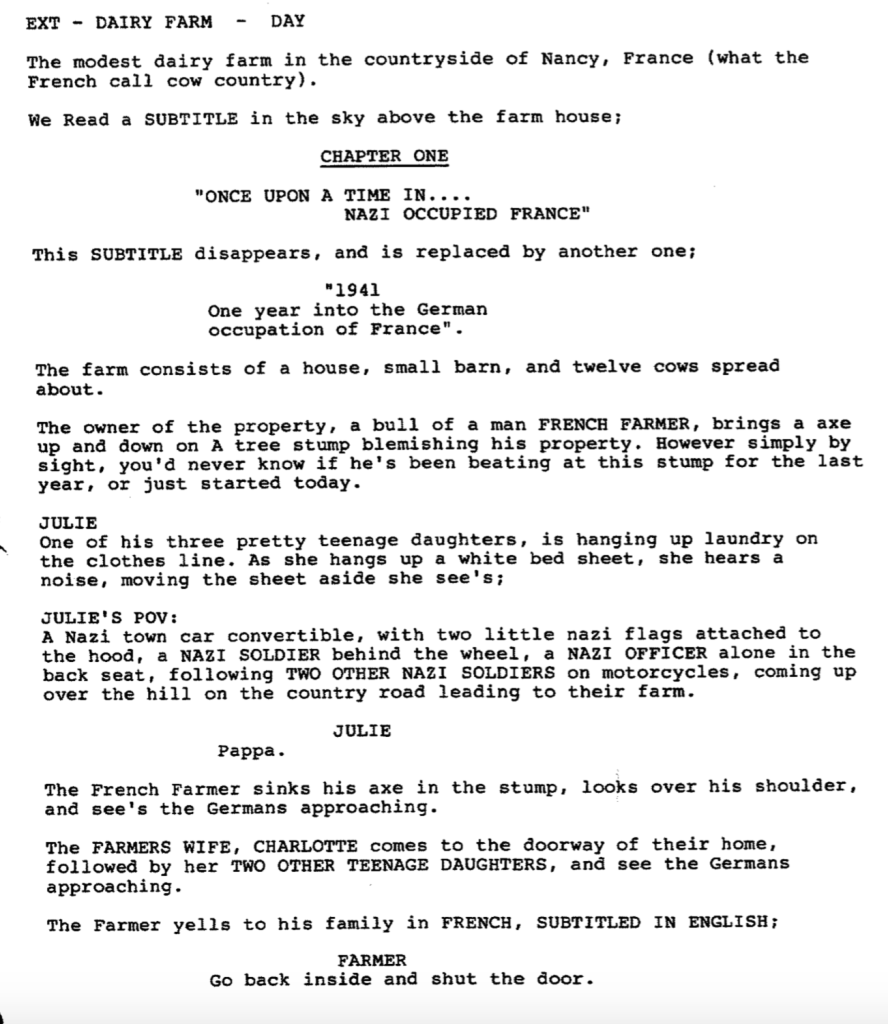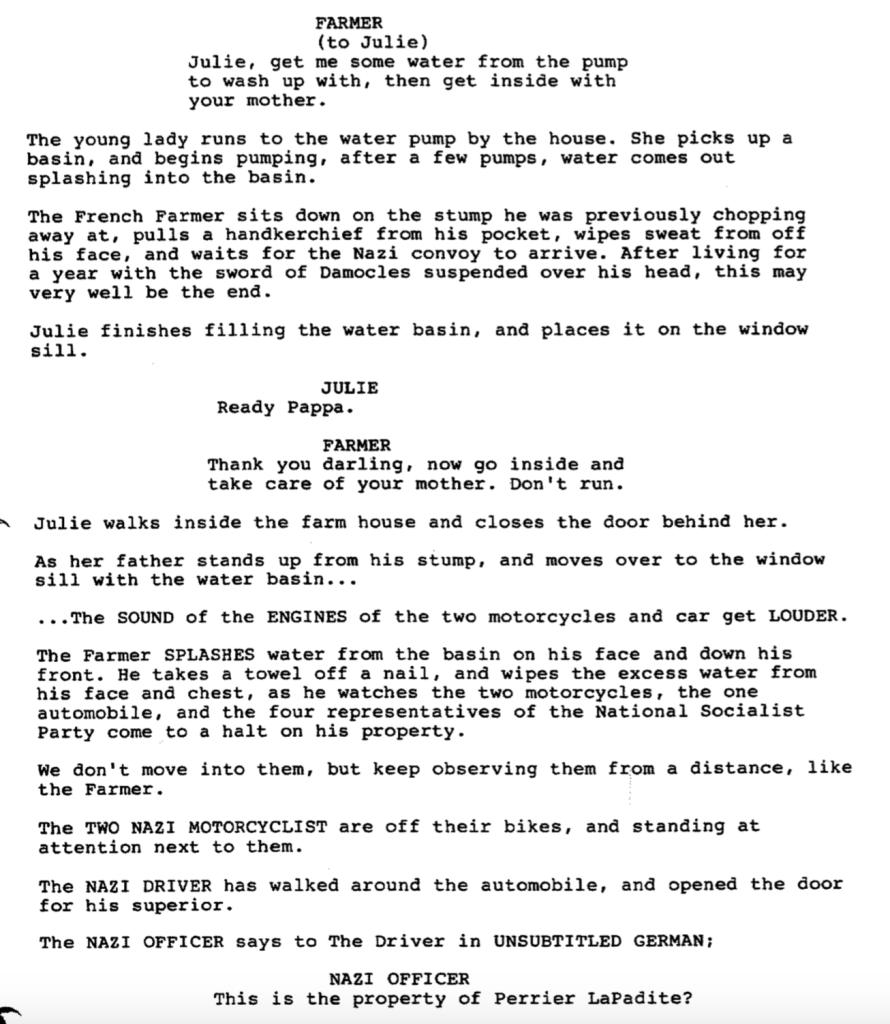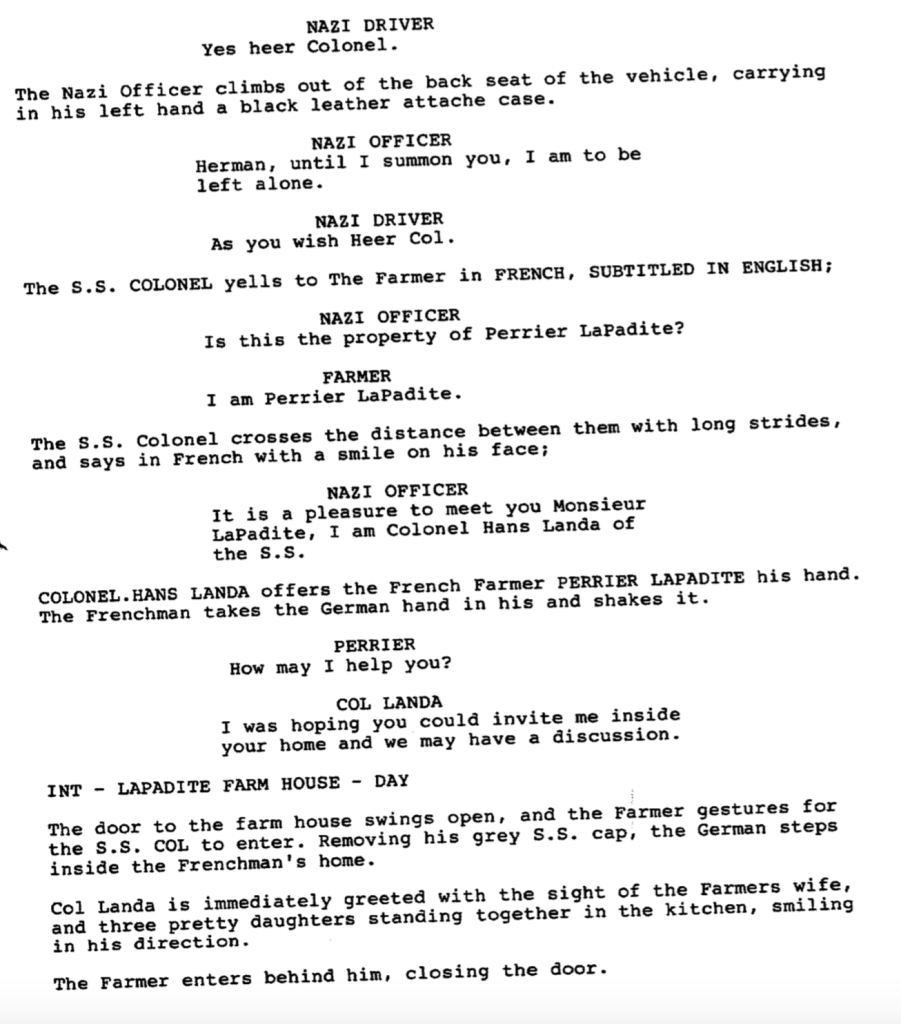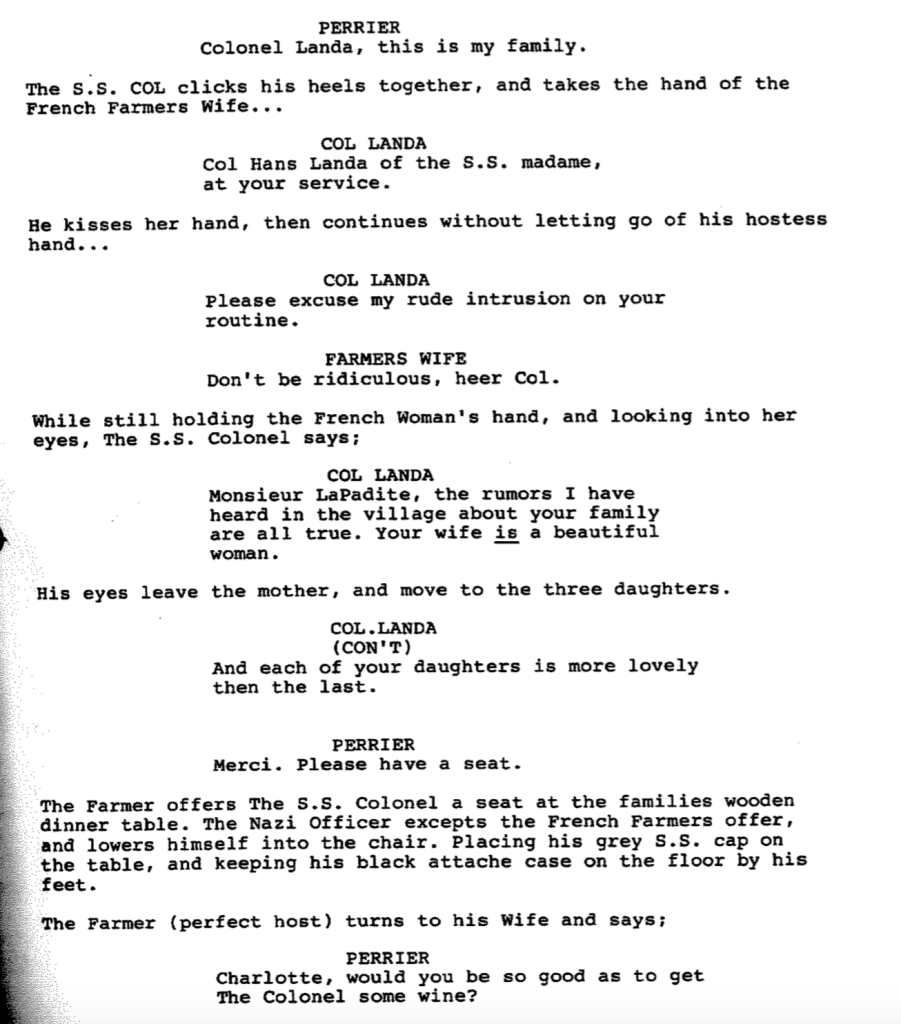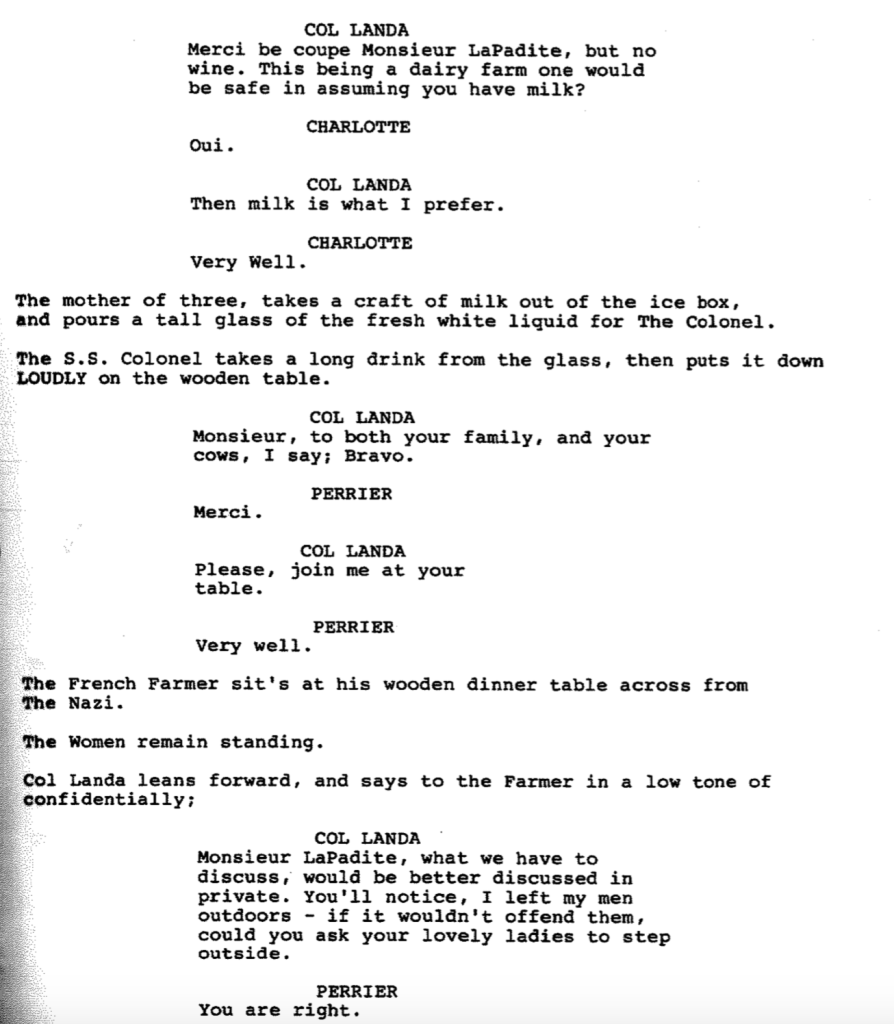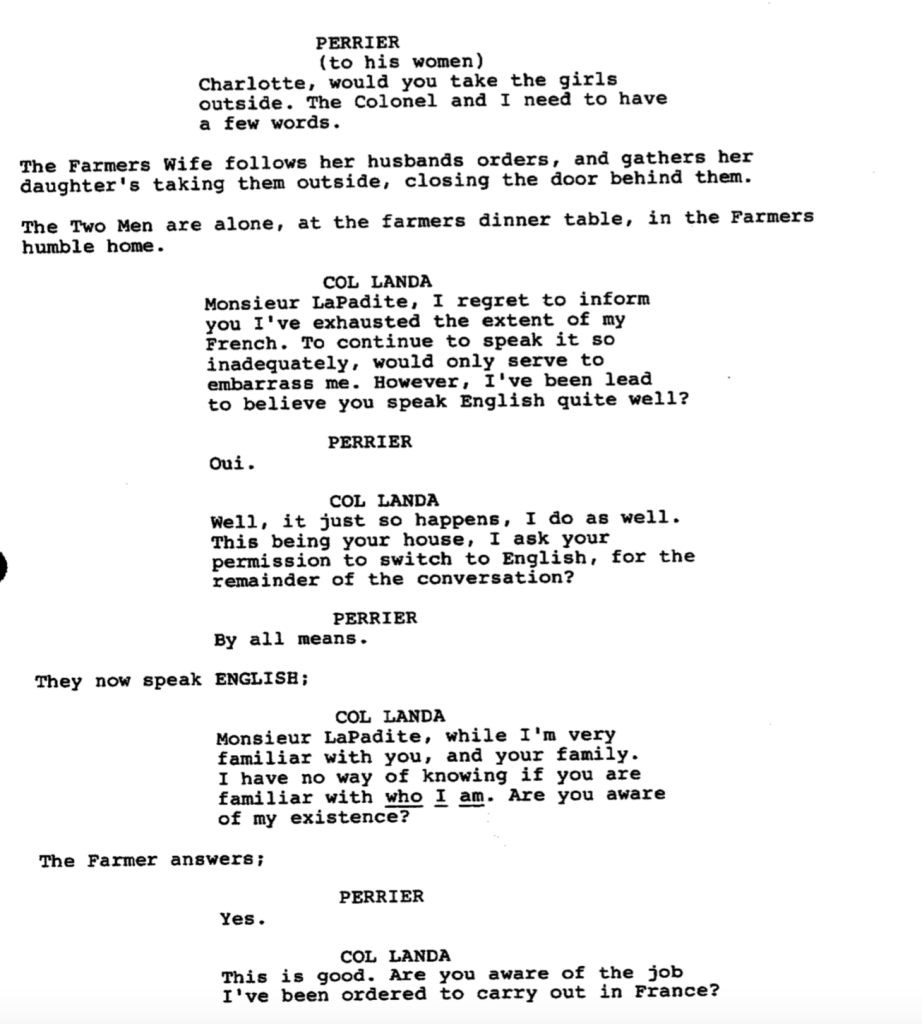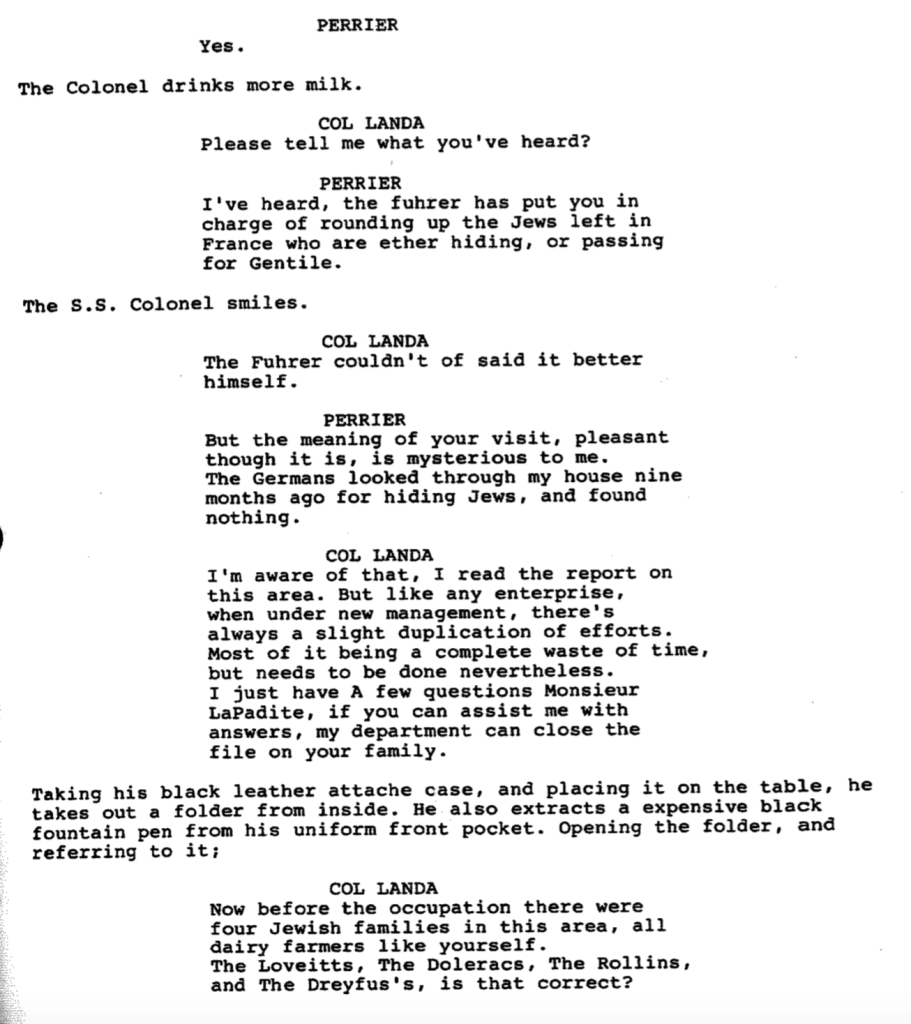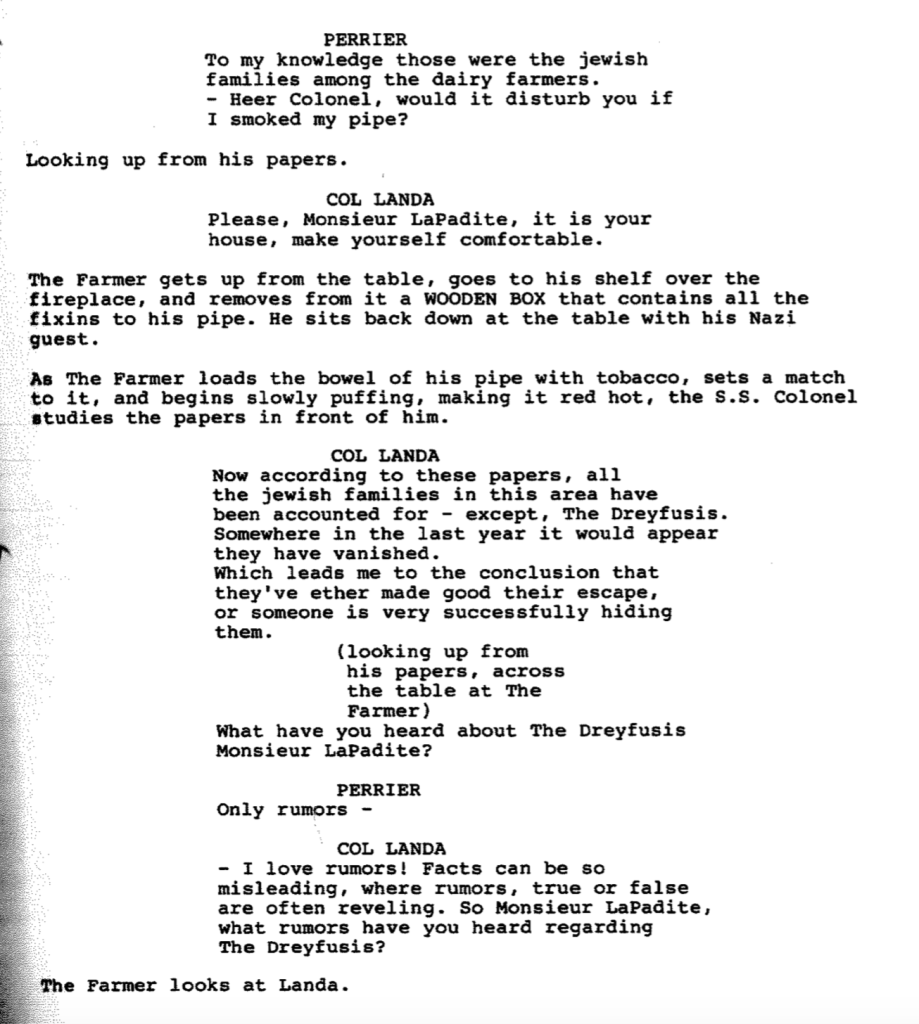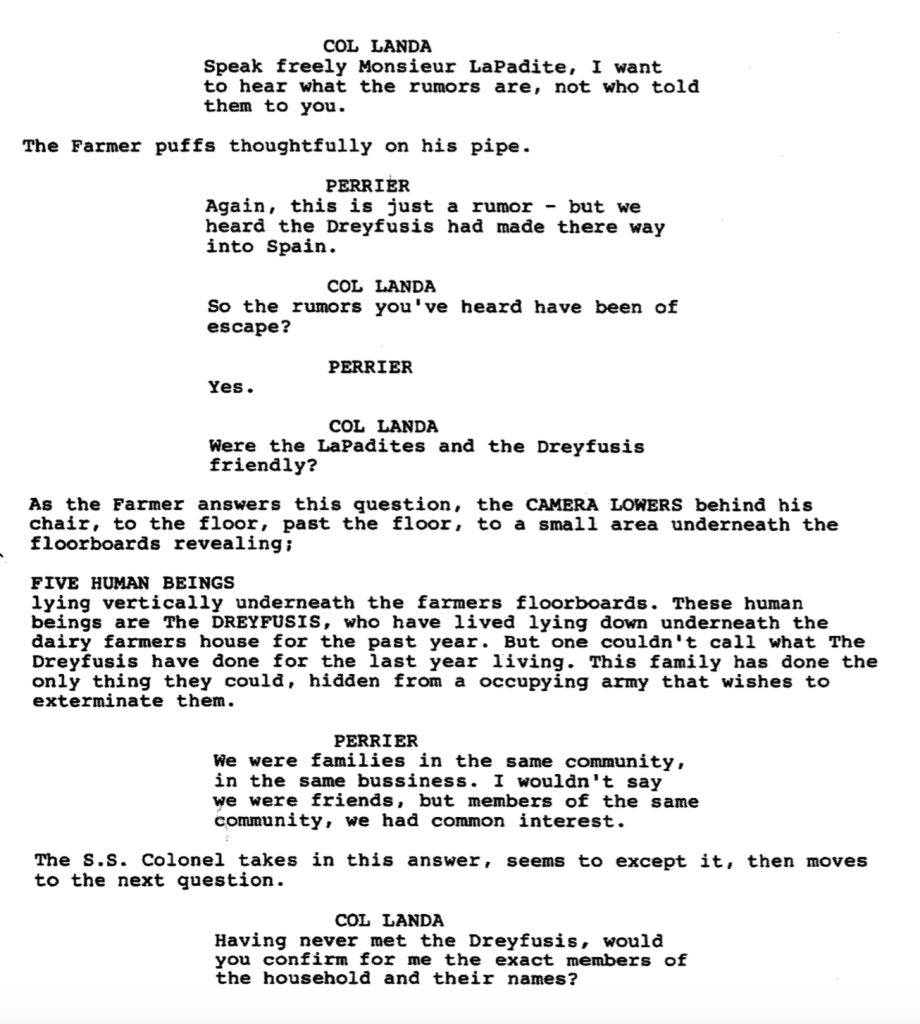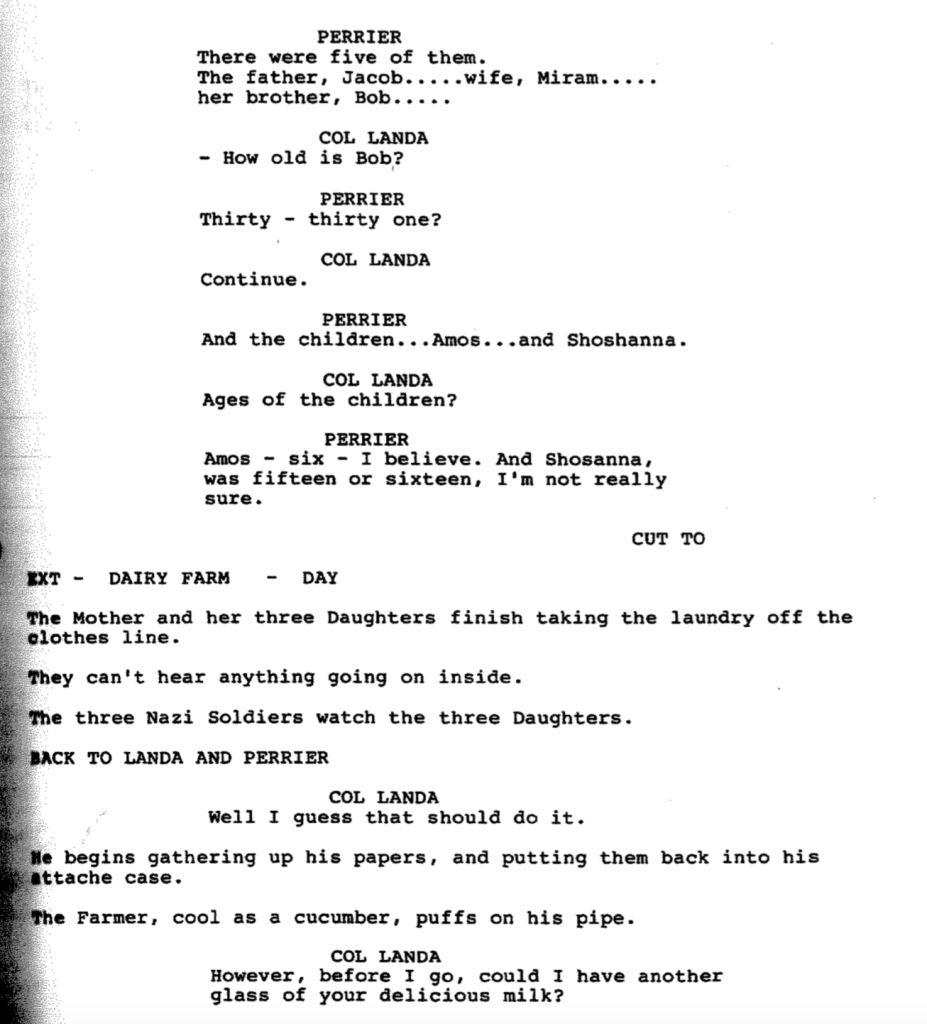We are almost at the end of the First 10 Pages Challenge! You have until Sunday, 11:59pm to submit your entry. Send a PDF of your pages to carsonreeves3@gmail.com with the subject line “FIRST 10 PAGES.” Head over to the original post to find out more about the challenge and what I’m looking for. I’ll let you know Monday (after I see how many entries I get) when – or IF – a winner will be announced. It’ll likely be no longer than a month.
Here are five of those entries. For those of you new to First 10 Pages breakdown posts, what I do is take five entries, show you how far I got, and explain why I stopped when I did. I’m hoping this information helps you craft your pages in such a way that they’ll be impossible to put down, which is the name of the game. Let’s get to it!
It’s never good when I’m confused by the very first slugline. I don’t know what “Tenement back-courts” are. Tennis courts? Basketball courts? As a writer, you never want to assume that the reader knows what you’re talking about if it’s in any way specific/unique. If I’m describing an area in Los Angeles and I say, “The Hollywood Sign,” you know what I’m talking about. If I say, “The Bird Streets,” you probably don’t. So I need to tell you what that is.
It’s important to talk about what the writer does next because it’s risky. And if it doesn’t work, you can lose the reader right away. The writer talks AROUND the setup instead of just setting the scene up. In other words, he doesn’t say, “VEA GREY searches through hanging laundry, looking for the perfect outfit.” He says, “GOLD-BROWN EYES. Searching. A scar on the bulge of her cheekbone. Tough times, but VEA GREY’S been tougher.” We’re talking AROUND the action, AROUND the introduction of the character, instead of just setting things up normally.
An argument can be made that this scene is set up like a movie. It’s almost like we’re a camera and we’re meeting this person, as well as what she’s doing, image by image. Unfortunately, a lot of readers don’t like this, myself included. We’d rather you just tell us what’s going on. I had a hard time understanding what I was looking at, so I was already on edge. And once we get to the arcade, my mind has drifted, and I’m out.
Let me remind you of the point of the exercise. It’s to hook the reader immediately. Not get all artsy-fartsy and try to impress the reader. That never works.
These pages were okay. I like the paranormal ghost hunter sub-genre, so I gave the pages a little longer than I normally would. That’s something you can’t control as a writer – if the reader likes your subject matter or not. The only thing you can do is send your script out to as many people as possible, increasing the odds that more people who enjoy the genre will read it.
There just wasn’t a big reason for me to keep reading here. The teaser was unique, which I liked. But once we got to the ghost hunting scene, it felt too familiar, and sloppy to boot. There wasn’t enough structure to the scene. What the writer should’ve done is set the scene up from the start. Build the scene like a mini-screenplay, with an Act 1, Act 2, and Act 3. Actually, that’s my best advice to pull a reader in right away, is open with a scene that’s a mini-story within itself. This is exactly what they did with Inglorious Basterds. It’s what they did with Scream. It won’t work for every script. But if there’s even a chance it will work for yours, consider it.
Oh yeah, and get a proper screenwriting program! Readers have been known to blacklist writers with text this light.
This scene moves too fast. Remember that hooking a reader doesn’t mean racing through a scene at breakneck speed. In fact, it can mean the complete opposite. In the case of this script, my first question is, why are they here? They’re driving through this place – Wildland Ranch – that appears to be special, like a backwoods Disney Land. Yet they don’t appear to be going here. The way they’re talking to each other, you’d think they were on their way home. It’s odd.
Then, when this woman pops out of nowhere, everything occurs way too fast. When something this jarring happens – a woman appears in front of your car out of nowhere – you need to take your time. It takes all of three lines from “My baby’s missing, will you help me,” to our heroine agreeing to. I mean come on. We’re in the middle of nowhere. This woman seems off. There would be questions. Erin and Roy would probably fight about it awhile. Bottom line: The writing feels rushed. It doesn’t seem like the writer has thought through the scenario. And for that reason, I’m out.
There is absolutely nothing wrong with these pages. Nothing. But there’s nothing exceptional about them either. Let me remind you what the exercise is again. It’s to hook the reader. It’s not to write something that’s “fine,” or even “ better than fine.” It’s to GRAB THE HELL out of the reader and make it impossible for them to stop reading
Starting your script with a murder is an above-average opening scene choice. A dead body gets the juices flowing. We’re curious who this is, what happened. A goal is set up right away – solve the murder. The problem is, I’ve read hundreds upon hundreds of scripts that have started with a murder. What makes this different? That she’s a celebrity? I’ve read tons of celebrity murders as well.
You have to find a way to make your scene unique. Here’s the opening of an early draft of Silence of the Lambs, which covers another familiar setup – an agent engaging in a dangerous hostage situation. Ignore the bold text. Someone did a bad digital PDF transfer from the original script.
Would you keep reading? I would. Notice that by making a slight tweak – the unexpected reveal that the suspect’s finger is taped to the trigger in a manner where he’s unable to use it – gives the scene a fresh feel (not to mention puts our hero in serious danger). Remember, the audience has seen everything. You need to work your ass off to give them something they haven’t.
Wow! I made it to the end of another ten pages. Sweet! Okay, why did I read all ten of these pages? There’s nothing spectacular here. But much like Bill’s pages from last week, there wasn’t any reason to STOP READING. The writing is achingly simple. And that’s a good thing. Unlike the first entry, I’m not trying to piece together the simple actions of my main character. Everything is clear as day.
Another thing is that in all the scripts I’ve read, never has one started with a woman teaching immigrant women how to wear their bathing suits properly so they don’t get arrested. The value of originality in a world so saturated with content is high. That’s why I read past the first page.
The writer then shifts to a marriage ripe with conflict. It’s not over the top but we sense it in their phone call. Remember that when you establish conflict, there is a subconscious need for the reader to keep reading to see if that conflict gets resolved (if she smiles and says “okay,” there’s no mystery to this marriage). From there we get this fun little wallet-stealing fiasco where we’re wondering if Alice is going to come out victorious or not. What a great character, too. Who doesn’t like a woman who puts her reputation on the line to do what’s right?
I have to admit that I don’t know where this movie is going from here. But I like this feisty main character so I’m keen to find out. What did you think?
Genre: Dramedy
Premise: (from Black List) The longtime assistant of a famous singer must navigate the rocky waters of the LA music scene to make her dreams of producing music a reality.
About: Today’s script finished JUST OUTSIDE the Black List’s top 10. Flora Greeson is just getting started with her career. She scored a rewrite job on the Elizabeth Banks project, “When Prince Made a Chambermaid His Queen for a Day,” about an MTV contest in the 80s where a fan got to be Prince’s date for a night. This is the script that got her the gig.
Writer: Flora Greeson
Details: 99 pages
Music flicks are hot right now, people. The double-hit whammy of Bohemian Rhapsody and A Star is Born has whet studios appetites. Today’s script tries to take advantage of the craze. Let’s see if it succeeds.
26 year-old Maggie Sherwood is an assistant to one of the most important singers of the last three decades, Suzanne Wilson (Aretha Franklin, Mariah Carey, and Whitney Houston rolled up into one). Maggie has finally graduated from running errands to producing Suzanne’s current project, a Greatest Hits live album.
But Maggie is frustrated with Suzanne. She thinks she should be releasing new music, not going back to the well, even if that well is bottomless. Suzanne is reluctant to the idea, which sends Maggie off in search of someone new she can produce. One day, while in the drug store, she bumps into the impossibly handsome David, a great singer held back by an anxious streak. Maggie tells him that if he gives himself over to her, she can make him a star.
Naturally, she starts falling for him, and their impromptu musical assignments begin interfering with her assistant job. Suzanne has a giant promotional concert for the Live album, and she needs Maggie now more than ever. Specifically, she needs a hot young act to bring some millennial attention to the concert. I think you know where this is headed.
Maggie orchestrates some last second shenanigans to make David the act. But while Maggie assumes Suzanne will be the tough sell, it turns out it’s David. Will she be able to convince him? Or will a last second bombshell ruin everything?
I know what everyone who just read this summary is thinking.
“That sounds like the most cliche plot ever.”
And you’d be right. We’ve seen this plot time and time again. But here’s why it’s still a good script – because Greeson nailed the execution. It wasn’t a slam dunk. But she got most of the pieces right. Which made for a highly entertaining read.
Look. We all want to be the next Tarantino, or Jordan Peele, or Diablo Cody, or Charlie Kaufman – that writer with an impossibly unique voice that the town goes bonkers over. But that’s not the only way to break in. You can work in this business a long time by becoming a Screenwriting Execution Nerd – someone who knows how to get all the pieces right. It’s the difference between Tom Brady and Eli Manning. Tom Brady is Tarantino. He does things nobody else can do. Eli Manning is Derek Kolstad (the writer of John Wick). He’s more of a game manager. But guess what? Eli Manning won 2 Super Bowls. Same thing with Kolstad. He built a major franchise. So don’t hate on execution. If you can learn how to nail this unique skill that is screenwriting, people are going to hire you.
Covers executes three things really well. For starters, the characters in this script are fun and vibrant. Remember that if you can make us love your characters (specifically your main character), half your job is done. That’s because audiences like following people they like, even if the story is flawed. Maggie gets shit on all day, but keeps plugging away. She’s got a good sense of humor about her position. She’s also talented at what she does. These are all things you would admire in a real life person. So of course you’re going to like them in a fictional one.
Even Suzanne, who plays second fiddle in the story, is interesting. She’s riding on the success of her past instead of taking a chance and trying to do something new. So there’s conflict there. Where there’s conflict, the audience will want to keep watching to see if that conflict is resolved (in this case, whether she’ll record new music or not).
Next, the plotting here is STRONG. We’re always moving forward. The first scene of the script has us dropped into our heroine running around in preparation for her boss’s party. And it never stops. By creating this GOAL of the Greatest Hits Live Album slash promotional concert, we always have something we’re moving towards. That’s how you write good plots. The characters are moving towards something important.
Finally, Greeson KNOWS HER SUBJECT MATTER. She has a passion for music. When I started writing, I didn’t think this was important. Eventually I realized that the name of the game was pulling the reader into your world. Once they’re in your world, you have them. So the more you know about the subject matter you’re writing in, the easier it is to pull people into your world. These characters in Covers are able to rattle off artists and albums and songs the way only people who live in the music world can. Not to mention the technical things like what a recording session looks like, or what a day in the life of a real music legend looks like. All of that felt legitimate, which made me believe in the story.
When you don’t know your subject matter, everything you write is a copy. For example, if you’re writing a cop movie and you’ve never researched a cop’s job, you’re probably going to write the character based on some other cop character you saw in another movie. And don’t get me wrong. Sometimes you can get away with this. All I’m saying is that when you’re writing about a world you REALLY understand, it makes a difference. I fully trusted that Gleeson knew this world inside out. The details are way too specific for that not to be the case.
The reason Covers doesn’t get a higher score from me is, one, it’s an unoriginal plot. You can’t escape that. You can only wow someone so much with familiarity. And two, there’s a late twist in the script that’s borderline disastrous. It’s such a misguided choice that it almost sent me into ‘wasn’t for me’ territory. I was so mad because I wanted to celebrate the power of great execution with a high score. But I can’t let this ending go. I won’t spoil it but feel free to talk about it in the Comments Section with spoiler warnings.
[ ] What the hell did I just read?
[ ] wasn’t for me
[x] worth the read
[ ] impressive
[ ] genius
What I learned: This is going to sound obvious but when it comes to being a Screenwriting Execution Nerd, you need to know how to make plots move (a complete command of the 3-Act Structure), you need to know how make heroes likable (understanding the traits that make human beings likable in general), and you need to know how to add depth to characters (through inner conflict or flaws). If you can’t do these things, you need to have an amazing voice, like Tarantino or Diablo Cody. Otherwise, why would somebody hire you?
Genre: Thriller
Premise: A slave woman runs away from her secluded plantation only to discover a shocking reality that lies beyond the tree line.
About: A Tarantino disciple, Krystin Ver Linden worked with the legend for seven years. This spec finished in the top ten of last year’s Hit List. Ver Linden’s got a biopic set up (who doesn’t!) at Lionsgate about astronaut Sally Ride. This script is being developed at Imperative. Joel Silver is one of the producers.
Writer: Krystin Ver Linden
Details: 113 pages
Are pre-pages the new First 10 Pages? Screenwriters seem to be set on hooking readers BEFORE hooking readers. Head’em off at the pass!
Chirsty Hall’s now infamous scrawl has appeared to start a trend. Except I actually liked this pre-page. Here’s all it said: INSPIRED BY TRUE EVENTS… (scroll down)… SERIOUSLY…(scroll down)… THIS ACTUALLY HAPPENED.
When you start your script off with a statement this bold, it acts as its own line of suspense. Before we’ve even begun, we know we at least have to get to the “actually happened” part. Any tool you can think of to keep the reader invested is fair game. Even if it’s pre-story.
When we meet 26 year old slave, Alice, she is secretly marrying another slave, 30 year old Joseph. But then house owner Paul busts in and breaks it up. Cut to the next day where we see the daily activities on this house plantation. Joseph is out picking cotton while Alice works around the house.
Paul has a thing for Alice and takes advantage of her whenever he can. The only way she’s able to pass time is wondering what’s beyond those weeping willow trees in the distance. The entire plantation is surrounded by them, and there are rumors that something special can be found for anyone brave enough to escape.
Alice convinces Joseph to escape with her but Paul finds out beforehand and has Joseph killed. With no reason to stick around anymore, Alice finally makes a break for it (MAJOR SPOILERS FROM THIS POINT FORWARD) and when she gets past the trees she finds… a highway??? Well, to us it’s a highway. To her, she doesn’t know what it is. Nor does she understand the giant speeding machines that are racing back and forth on it. The decade, it turns out, is not the early 1800s. But rather the 1970s.
A kind trucker, Frank, spots Alice, stops to pick her up, and takes her to the hospital. When the doctors hear her story (“I’m a slave who escaped a plantation”) they think she’s a delusional nutbag and plan to send her to a psychiatric hospital. So Frank sneaks her out and brings her to his place, where she experiences modern amenities, like refrigerators and television, for the first time.
Alice decides she wants to confront Paul’s ex-wife, who left the plantation years ago. With Frank’s help, she tracks her down, and the two meet. Paul’s ex apologizes, explaining that she was tricked as well. But Alice isn’t buying it. Hell bent on getting proper revenge, Alice constructs a much bigger plan, one that will let the world know what happened to her in that house. And she’s going to do it in the most dramatic way possible.
Today we need to talk about an important screenwriting topic – THE TWIST.
The twist is, in many ways, a trap.
It forces you, as the writer, to lie, to hide, to manipulate, all so that you can pull a ‘gotcha’ moment at the end. I often tell screenwriters that you’re writing two screenplays every time you have a twist. The story that the reader sees, and the real story.
Now this doesn’t mean that a twist is bad. The reveal of a great twist is one of the most exhilarating feelings you can have watching a movie. I still remember the shock I experienced at the end of Oldboy, my mouth hitting the sticky theater floor during The Sixth Sense, or the helplessness I felt at the end of The Wicker Man. But it’s one of the most difficult assignments to pull off, and most writers fail in one key way.
That way is that the twist is obvious well before it arrives. The writer telegraphs it so blatantly, everyone knows it’s coming. Ego secretly being a bad guy in Guardians of the Galaxy 2 is a prime example. But mostly you see this mistake in amateur screenplays. In fact I just read a consultation script that had this problem. And it’s one that I thought was going to do “Alice” in as well.
“Alice” spends so much time asking what could be on the other side of those trees that you know a twist is coming. And the options for this twist are limited. We know this is a true story so she’s not going to walk out into a spaceport on Mars. It’s probably going to be that we’re in modern day, or at least close to it.
But here’s where aspiring screenwriters can learn something. Ver Linen didn’t wait until the end to give us the twist. She revealed it at the midpoint. Most writers are afraid to do this. They want their big “Sixth Sense” moment. But if all you’re doing is writing towards an ending twist, your script is doomed to fail. If Ver Linen had spent another 50 pages talking about what’s beyond those trees, I would’ve died of boredom. By executing the twist at the midpoint, the reader not only gets that shocking twist, but they now have no idea where the story is going next.
Before you go off and write a midpoint twist into every one of your screenplays, understand that it comes with its own set of pitfalls, the biggest of which is that once you’ve executed the twist, you must start the story over. Once Alice gets out of the farm, it’s a whole new movie. So if you don’t have a plan for how to re-start the narrative, a midpoint twist is pointless. What a lot of writers will do is rest on the laurels of that twist and fumble their way through the rest of the story. And, unfortunately, there’s some of that going on here. It’s not that Alice’s pursuit of justice is uninteresting, but it’s underpowered in comparison to the first half of the script.
So which of these – endpoint or midpoint twist – is the best option for you? It comes down to your story. If you have a fully fleshed out story that’s interesting regardless of whether there’s a twist or not, an ending twist works great. The Wicker Man has a compelling investigation that can easily withstand 100 minutes of viewing. Even if he doesn’t get burned at the end, we still would’ve been satisfied. If your narrative is less potent (there isn’t a whole lot for your characters to do), however, you should consider a midpoint twist. Cause there’s nothing more boring than an already weak narrative that’s drawn out. Just make sure you have a plan on the backside of that twist.
Alice is a wonky imperfect screenplay. But it’s an entertaining screenplay. I like that somebody found a true story and turned it into an accessible genre piece as opposed to yet another desperate bid for Oscar attention. People respect that. It’s how Jordon Peele won an Oscar. It probably needs a few more drafts though, especially in regards to its second half.
[ ] What the hell did I just read?
[ ] wasn’t for me
[x] worth the read
[ ] impressive
[ ] genius
What I learned: A lot of you ask whether you should include your big twist in the logline. The answer to this is “Probably.” But, if you don’t want to, you should create a sense of curiosity the way Ver Linden does with this logline. She doesn’t give anything away, yet we still get a sense of what we’re in for, which is what a good logline should do. “A slave woman runs away from her secluded plantation only to discover a shocking reality that lies beyond the tree line.”
Genre: Thriller/Supernatural
Premise: (from IMDB) After a series of paintings by an unknown artist are discovered, a supernatural force enacts revenge on those who have allowed their greed to get in the way of art.
About: From longtime screenwriter Dan Gilroy comes Velvet Buzzsaw, his third directing effort. The film brings back the team of Gilroy, Gylenhaal and Russo (Nightcrawler) and debuted Friday on Netflix.
Writer: Dan Gilroy
Details:113 minutes
First of all, let me say that I love this practice of movies debuting at major film festivals then appearing on Netflix or Amazon days later. I’ve always hated hearing about Sundance movies then having no idea when or where I’d be able to see them. I might have to wait 8 months before I hear about the film again. More movies should do it like this where you hear the buzz (heh heh) then get the movie immediately. Call that a millennial mindset if you will, but I was so happy to see this up on Netflix Friday.
Now the way I see Dan Gilroy is that he’s 1 for 2. Nightcrawler was as close as we’re ever going to get to a modern day version of Taxi Driver. I loved that script from the opening page. Which makes it all the more perplexing that Gilroy followed it up with Roman J. Israel, Esq. That script was the opposite of Nightcrawler. It was verbose, unfocused, and lacked structure. Should’ve changed the “Esq” to “Ick.” I actually felt bad giving it a negative review because I thought maybe it was a super early draft. But nope. That’s the draft Gilroy went with. It’s hard to make Denzel Washington look bad. But that script achieved it.
This makes Velvet Buzzsaw the tiebreaker. If this is good, Roman was a misstep. If it’s bad, Nightcrawler was an anomaly. Time to place it up on the wall and see what this piece is about.
Josephina is a British art agent in the burgeoning LA art scene. She often rubs elbows with Morf, a bisexual art critic who she once had a fling with. The two are friendly with art gallery owner Rhodora, who has become so jaded by art that nothing impresses her anymore. Actually, that could be applied to everyone here.
After a long day, Josephina returns to her apartment where she sees that her neighbor, an old man named Vetril Dease (does anyone have a normal name in this movie?), has died in the stairway. In the coincidence of all coincidences, it turns out Vetril was an artist. But not just any artist. He was extremely talented, painting dozens of dark haunting paintings. Josephina immediately claims the paintings and starts selling them.
Morf is so taken by Dease’s work that his former feelings for Josephina are reignited. But as the two enter into a relationship, strange things begin happening around Dease’s paintings. A lowly intern crashes his car while transporting the paintings. A fellow gallery owner is found hung by his scarf near another.
It appears that these paintings are coming to life and killing the greedy art leeches who covet them. When Morf becomes the latest to see the paintings move, it’s only a matter of time before he ends up like everyone else. Unless he can figure out why Dease’s spirit is doing this and put it to rest first.
Ooh, a lot to get to with this one.
Let’s break down the first 10 pages since that’s been the theme this month.
The great thing about starting your story in a captivating manner isn’t just that it hooks the reader. It’s that it hooks an audience. It’s a good thing for the movie. Amateur screenwriters on the brink of breaking in understand this (as do struggling professionals who’ve been forgotten). They toil over those first ten pages because they know if they hook you off the bat, there’s a good change you’re going to like their script.
In Nightcrawler, Gilroy starts his screenplay with Louis Bloom stealing something. He’s immediately confronted by a cop and has to talk his way out of it. Not only is something interesting happening in this opening, but Gilroy does an excellent job establishing who Louis Bloom is through the interaction. There’s a moment where Louis says, “Excuse me, but that gate was open, sir. I was under the opinion that it was a detour. What kind of uniform is that?” Just the fact that Bloom is turning the questioning around on the cop gives us a great feel for who this person is.
But something funny happens when a screenwriter becomes an established professional, when they get to that stage where their projects are greenlit without anyone having to read their script. They get lazy with their openings. They rationalize that they can take their time, sometimes defiantly so. This can result in 20 pages going by before anything interesting happens.
Velvet Buzzsaw falls into this category. Some guy played by Jake Gylenhaal stumbles into an art showing, yet we have no idea who he is or what he does. He seems slightly arrogant and bored, but that’s all we have to go on. We watch as he ricochets between people and displays, never sure why he’s here or what he’s doing. It’s the complete opposite of Nightcrawler, which started with something happening that clearly established our hero.
We then ping pong over to the street where some British woman gets dumped on the phone. Who is this woman? What does she do? Why do we care that she just got dumped if we don’t know these things? As these questions linger, she joins us in the art showing as we continue to bounce around without purpose. Even if you make the argument that Gilroy is eschewing a compelling opening in order to introduce the cast of characters, it doesn’t work because none of these characters are well established. We only know that they work in the art world. I actually had to go to Wikipedia after the movie to find out what Josephina’s job title was. That’s bad writing.
If there’s anything I’ve learned, it’s that when the first ten pages are sloppy, you’re going to get a sloppy movie. And that’s exactly what happens. This movie is all over the place. First of all, who’s our protagonist? I thought it was Morf since we meet him first. But eventually I realize it’s Dumped Girl. And I only came to that conclusion because she’s the one who found the dead artist. But if you would’ve asked me if she was the hero before that, I would’ve said no. Morf was. Confusing confusing confusing.
On top of that, there’s no clear genre here. This starts off as a goofy satire about the art scene. Then it becomes a thriller. And then, out of nowhere, it becomes an out and out horror film, where paintings come to life. WTF??? I guess you can throw single protagonists and genre out the window if you want. There are no rules. But don’t be surprised when people leave your movie feeling like they watched some quickly thrown together experimental student film.
I mean everything was messy here. Louis Bloom was so carefully constructed, you understood him intricately. He’s a sociopathic capitalist who will try to talk his way out of anything. In contrast, Morf is vague and random. It seems like the only reason he’s bisexual is because Gilroy didn’t know how to make him interesting and threw the bisexual tag on him in the hopes that it would somehow make him more complex.
It’s becoming increasingly clear to me that filmmakers are using Netflix as a way to explore their weirder more experimental ideas that nobody else would let them make. In theory, that sounds good. In practice, it means we get movies like the pointless Mute, the jumbled Hold The Dark, the boring Roma, and now Velvet Buzzsaw, a sloppily constructed mish-mash of ideas in search of a protagonist, a genre, and a plot.
[ ] What the hell did I just watch?
[x] wasn’t for me
[ ] worth the stream
[ ] impressive
[ ] genius
What I learned: A lot of writers don’t realize how much effort screenwriters put into their dialogue. They assume the words just magically come out of the writer’s head. But how can a writer understand the way someone speaks in an industry they know nothing about? I wasn’t surprised at all, then, when I heard Gilroy’s answer to this question about how he wrote authentic “art world” dialogue. Here’s the question and answer, from a Vulture interview…
One of the elements of the film that I can imagine was fun, certainly in the writing process, was the “art-speak” — the very obtuse, heady way in which critics and gallerists and artists create meaning around their work. Did you work with anybody while writing those parts of the script, or did you just immerse yourself in that language and read a bunch of “Art in America?”
Yeah, I researched it for months, read articles, interviews; I brought in three technical advisers. And it is its own world, and it is its own sort of language. And I thought I had the language down at times, and then somebody who runs a gallery in L.A. would come in and say, “You should change that word to this, because that’s not a word we use.” And it is its own lexicon. There’s no question about it. But I like going into a world and learning the language of it.
I’m trying to catch up on all the First 10 Pages entries so no Amateur Offerings this weekend, sad face emoji. As a reminder, you still have TEN DAYS to enter the First 10 Pages Challenge. If you’re interested, head on over to the announcement page which will explain what to do. I’ll be reviewing the new Dan Gilroy (Nightcrawler) Jake Gyllenhaal flick, Velvet Buzzsaw, on Monday. Check it out on Netflix if you want to participate in the discussion. In the meantime, here are, arguably, the best opening 10 pages of a screenplay ever. Would you keep reading?

